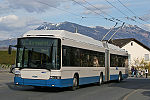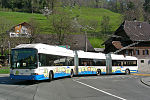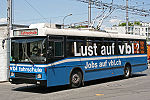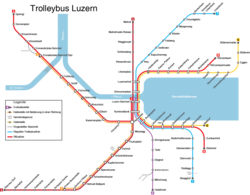Trolleybuses in Lucerne
| Lucerne trolleybus system | |||
|---|---|---|---|
 A Hess Swisstrolley crossing the Reuss, 2005. | |||
| Operation | |||
| Locale | Lucerne, Switzerland | ||
| Open | 7 December 1941 | ||
| Status | Open | ||
| Routes | 6 | ||
| Operator(s) | Verkehrsbetriebe Luzern (VBL) | ||
| Infrastructure | |||
| Electrification | 600 V DC parallel overhead lines | ||
| Statistics | |||
| Route length | 37.634 km (23.385 mi) | ||
| |||
| Website | http://www.vbl.ch Verkehrsbetriebe Luzern (VBL) (in German) | ||
The Lucerne trolleybus system (Alemannic German: Trolleybussystem Luzern) forms part of the public transport network of Lucerne, which is the capital city of the canton of Lucerne, Switzerland. Opened in 1941, the system had replaced the Lucerne tramway network by 1961.[1]
As of the end of 2013, the system consists of six lines, one of which leads across the city boundary into the neighbouring towns of Emmen, Horw and Kriens. It is currently operated by Verkehrsbetriebe Luzern (VBL), has a total route length of 37.634 km (23.385 mi),[2] and as of about 2011 was carrying 27 million passengers annually.[3] The system is supplemented by various motor bus lines operated by the same transport company.
History
[edit]The system's individual trolleybus line sections went into service as follows:[1]
| 7 December 1941 | Bahnhof Luzern–Allmend (2.59 km) | Bahnhof Luzern–Breitenlachen: now line 4 Breitenlachen–Allmend: decommissioned since 2005 |
New connection |
| 25 January 1942 | Bahnhof Luzern–Dietschiberg | now lines 6 and 8 | New connection |
| 20 May 1951 | Luzernerhof–Wesemlinrain | now line 1 | Motor bus replacement |
| 15 November 1959 | Dietschiberg–Würzenbach (1.05 km) Bundesplatz–Emmenbrücke (4.38 km) |
now lines 6 and 8 now line 2 |
Motor bus replacement Tramway replacement |
| 11 November 1961 | Pilatusplatz–Kriens Busschleife Wesemlinrain–Maihof |
now line 1 | Tramway replacement |
| 11 November 1962 | Breitenlachen–Hubelmatt | now line 4 | New connection |
| 10 April 1966 | Bundesplatz–Matthof Wartegg–Biregghof |
now line 6 now line 7 |
New connection |
| 2 July 1986 | Schönbühl–Hirtenhof | now line 8 | New connection |
| 5 November 1990 | Kriens Busschleife–Obernau Dorf Emmenbrücke–Sprengi |
now line 1 now line 2 |
Motor bus replacement New connection |
| 23 August 2004 | Wesemlinrain–Unterlöchli | now line 7 | New connection |
| 15 December 2013 | Brüelstrasse–Büttenenhalde | now line 6 | Motor bus replacement |
| 12 December 2016 | Kriens-Emmenbruecke | now line 5 | New connection (75th anniversary) |

Lines
[edit]The present system is made up of the following lines:
| 1 | Obernau Dorf–Ebikon, Fildern | cross-city route | 38 stops | every 7.5 minutes | Bi-articulated buses |
| 2 | Sprengi–Bahnhof Luzern | radial route | 16 stops | every 7.5 minutes | Bi-articulated buses |
| 4 | Hubelmatt–Bahnhof Luzern | radial route | 9 stops | every 10 minutes | Articulated buses |
| 5 | Kriens–Emmenbrücke | cross-city route | 20 stops | peak times every 7.5 minutes / off peak every 15 minutes | Articulated buses |
| 6 | Matthof–Büttenenhalde | cross-city route | 23/24 stops | rush hour every 10 minutes / off-peak every 15 minutes | Articulated buses |
| 7 | Biregghof–Unterlöchli | cross-city route | 23/24 stops | every 7.5 minutes / off-peak every 15 minutes | Articulated buses |
| 8 | Hirtenhof–Würzenbach | cross-city route | 19/20 stops | rush hour every 10 minutes / off-peak every 15 minutes | Bi-articulated buses |
Lines 6 and 8 operate on the same overhead wires between Brüelstrasse and Schönbühl, so that on this section there are trolleybuses at 5-minute intervals during rush hour, and at 7.5-minute intervals at off-peak times. This combined section is described as double-line 6/8.
Fleet
[edit]This section needs to be updated. (December 2021) |
As of 31 December 2013, the VBL trolleybus fleet had 20 rigid, 26 articulated, and three bi-articulated vehicles There were also 16 trailers that can be used in combination with the rigid buses.[2]
In the 2010s, the Lucerne system was one of only two trolleybus systems worldwide, along with the Lausanne trolleybus system, that still operated trolleybuses towing passenger trailers. However, trailer use on the Lucerne system ended on 10 October 2017,[4] following the delivery of more new articulated trolleybuses, and such usage also ended in Lausanne – the last trolleybus system in the world to use trailers – on 4 May 2021.[5]
| Image | Fleet nos. | Quantity | Manufacturer | Electrics | Type | Configuration | Low-floor | Built |
|---|---|---|---|---|---|---|---|---|
 |
201–226 | 26 | Hess | Kiepe | BGT-N2C | Articulated | yes | 2004–2009 |
 |
231–233 | 3 | Hess | Kiepe | BGGT-N2C | Bi-articulated | yes | 2006 |
 |
234–242 | 9 | Hess | Kiepe | BGGT-N2D | Bi-articulated | yes | 2014 |
 |
252–254, 257–280 |
27 | NAW / Hess | Siemens | BT 5-25 | Rigid | no | 1989 (no. 251 built 1987–88) |
 |
301–316 | 16 | Lanz + Marti / Hess | none | APM 5.6-13 | Trailer | yes | 1998–2005 |
Type BGT 5-25 originally comprised 20 vehicles, nos. 181–200.
Of the 30 rigid versions of that type, the BT 5-25, to be acquired by the VBL, three vehicles had been retired by 2012: nos. 251, 255 and 256.[citation needed] In 2014, ten vehicles from that series were sold to the Valparaíso trolleybus system, in Chile: Nos. 265, 266, 268–270, 272, 273, 275, 276, 278.[6]
Depot
[edit]The Weinbergli depot is located on the route of lines 6, 7 and 8.
See also
[edit]References
[edit]Notes
[edit]- ^ a b "Trolleybusstadt: Luzern (Schweiz) - Geschichte History" [Trolleybus city: Lucerne (Switzerland) - History] (in German). TrolleyMotion. Archived from the original on 5 January 2021. Retrieved 2 July 2018.
- ^ a b "Die Fakten" [The facts] (in German). Verkehrsbetriebe Luzern. Retrieved 25 November 2015.
- ^ Brugger Kalfidis, Pia Maria. "Luzern setzt auf Trolleybusse" [Lucerne relies on trolleybuses] (PDF) (in German). Regionale Schienen. Retrieved 14 January 2012.
- ^ Trolleybus Magazine No. 337 (January–February 2018), p. 37.
- ^ Trolleybus Magazine No. 358 (July–August 2021), p. 162.
- ^ Trolleybus Magazine No. 320 (March–April 2015), p. 54. ISSN 0266-7452.
Further reading
[edit]- Schwandl, Robert (2010). Schwandl's Tram Atlas Schweiz & Österreich. Berlin: Robert Schwandl Verlag. ISBN 978 3 936573 27 5. (in German and English)
External links
[edit]![]() Media related to Trolleybuses in Lucerne at Wikimedia Commons
Media related to Trolleybuses in Lucerne at Wikimedia Commons
- Trolleybus city: Luzern (Schweiz) (in German) as archived 2021 (information through 2015 only).
- Trolleybus city: Luzern (Schweiz) (in English, but with less information) as archived 2021.
- Lucerne database / photo gallery and Lucerne trolleybus list at Urban Electric Transit – in various languages, including English.


